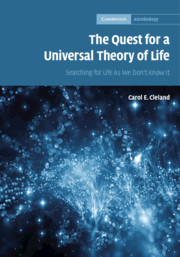Book contents
- The Quest for a Universal Theory of Life
- Reviews
- Cambridge Astrobiology
- The Quest for a Universal Theory of Life
- Copyright page
- Dedication
- Contents
- Acknowledgments
- Introduction
- 1 The Enduring Legacy of Aristotle: The Battle over Life as Self-Organization or (Genetic-Based) Reproduction
- 2 Why Life Cannot Be Defined
- 3 What Is a Scientific Theory?
- 4 How Scientific Theories Develop
- 5 Challenges for a Universal Theory of Life
- 6 Rethinking the Traditional Paradigm for Life: Lessons from the World of Microbes
- 7 Artificial Life: Could ALife Solve the N = 1N=1 Problem?
- 8 Searching for Extraterrestrial Life Without a Definition or Universal Theory of Life
- 9 A Shadow Biosphere: Alien Microbes on Earth?
- Conclusion
- References
- Index
8 - Searching for Extraterrestrial Life Without a Definition or Universal Theory of Life
Published online by Cambridge University Press: 05 September 2019
- The Quest for a Universal Theory of Life
- Reviews
- Cambridge Astrobiology
- The Quest for a Universal Theory of Life
- Copyright page
- Dedication
- Contents
- Acknowledgments
- Introduction
- 1 The Enduring Legacy of Aristotle: The Battle over Life as Self-Organization or (Genetic-Based) Reproduction
- 2 Why Life Cannot Be Defined
- 3 What Is a Scientific Theory?
- 4 How Scientific Theories Develop
- 5 Challenges for a Universal Theory of Life
- 6 Rethinking the Traditional Paradigm for Life: Lessons from the World of Microbes
- 7 Artificial Life: Could ALife Solve the N = 1N=1 Problem?
- 8 Searching for Extraterrestrial Life Without a Definition or Universal Theory of Life
- 9 A Shadow Biosphere: Alien Microbes on Earth?
- Conclusion
- References
- Index
Summary
When most people think about extraterrestrial life they envision intelligent, often technologically advanced, humanoid creatures, such as the Prawns (District Nine) and the Na’vi (Avatar), robots, such as Gort (The Day the Earth Stood Still), and the hive-like Borg (Star Trek). Most astrobiologists, however, are not looking for intelligent life. They are looking for bacteria-like organisms. For as discussed in Section 5.2, microbial life is almost certainly far more common in the universe than complex multicellular organisms, let alone intelligent, technologically sophisticated creatures. Because they are so tiny, detecting and identifying extraterrestrial microbes is especially challenging.
- Type
- Chapter
- Information
- The Quest for a Universal Theory of LifeSearching for Life As We Don't Know It, pp. 172 - 194Publisher: Cambridge University PressPrint publication year: 2019
- 1
- Cited by

